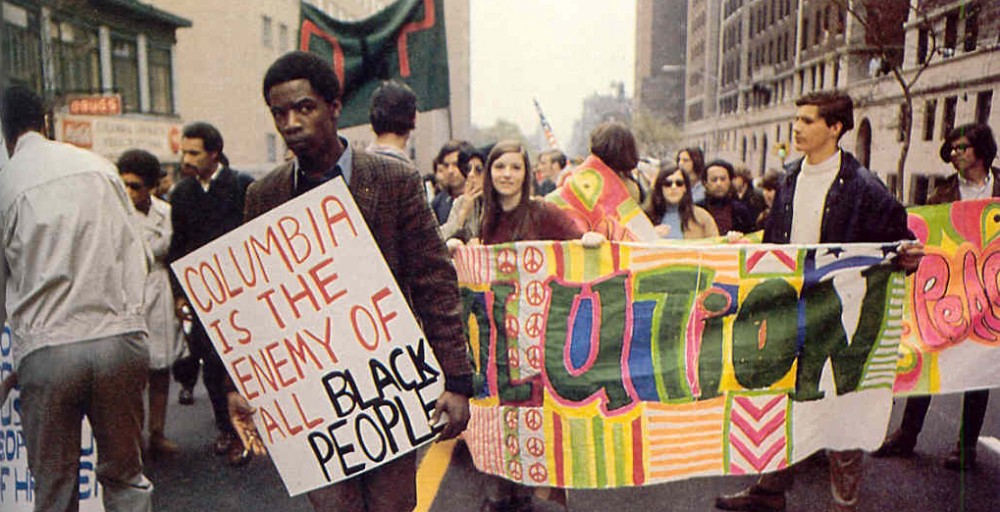Membership is open to all who share our commitment to a democratic society. We do not believe in leaders. We want Columbia University students to participate in events. We do not discriminate against race, sexuality, gender, disability, age, religion, nationality, ethnicity, political views, sex.
Columbia SDS has a non-hierarchal steering committee that makes decisions based on consensus. The steering committee is responsible for organizing and conducting meetings.
The National SDS has Chapters — the basic local unit, pursuing autonomous programs in the campus and the community; using the resources of the national organization for greater power; participating in national policy decisions through elected representatives. Associated Groups are local units with similar political interests, but who remain outside the national decision-making structures. Fraternal Organizations are other national groups who formally link themselves with SDS values and programs.
The National SDS Convention held each summer is the key forum for establishing policy and leadership for the coming year. It elects 17 officers who, with electoral local representatives, form the National Council, the chief administrative unit which meets quarterly.
The National SDS Staff of organizers and administrators is appointed by the National Council.
———————————————————————————————————————————————
Current chairperson of the Columbia SDS:
Mark Rudd — born in Irvington, New Jersey, attended Columbia High School in his hometown and then arrived at Columbia University in 1965. He just recently returned from a three-week visit to Cuba and was elected as chairperson in 1968. He endorses the Action Faction approach.
Current vice-chairperson of the Columbia SDS:
Nick Freudenberg — a Sophomore from Long Island, New York. He believes the only way to achieve freedom for any individual was to fight for the freedom of Blacks, Vietnamese and students.
———————————————————————————————————————————————
Previous chairpersons of the Columbia SDS:
John Fuerst 1966-67 — Created the Columbia University chapter of SDS along with David Gilbert, distributed the Port Huron Statement to interested individuals and increased a membership-based chapter.
Ted Kaptchuk 1967-68 — Currently studying Eastern religion, Kaptchuk wanted SDS to focus on issues concerning Columbia’s affiliation with the Institute for Defense Analysis and military recruitment on its campus. He was a key supporter of the Praxis Axis approach. On October 23 1967, he led 300 students into Low Memorial Library and presented a letter to President Kirk demanding the termination of Columbia’s involvement with IDA.
Previous vice-chairpersons of Columbia SDS:
Ted Gold 1967-68 — a senior from Brooklyn, New York, advocated for the Praxis Axis approach of education rather than direct confrontation.
———————————————————————————————————————————————
Previous chairpersons of the National SDS:
Robert Alan Haber 1960-61 — Founded SDS and was the first chairperson of the National SDS. A graduate of University of Michigan, he grew up in a Leftist household where his father support Franklin D. Roosevelt’s New Deal.
Tom Hayden 1962-63 — Born and raised in Michigan and later attended University of Michigan, Hayden helped found the National SDS. In 1962, he drafted the Port Huron Statement.
Todd Gitlin 1963-64 — Graduated from University of Michigan with a degree in Political Science, Gitlin helped organize the first demonstration against the Vietnam war on April 17 1965.
Paul Potter 1964-65 — Graduated from Oberlin College, grew up on an Illinois farm. He also helped organize the first national demonstration against the Vietnam War. Below is an excerpt of Potter’s speech on April 17 1965 during a march in front of the Washington Monument:
There is no simple plan, no scheme or gimmick that can be proposed here. There is no simple way to attack something that is deeply rooted in the society. If the people of this country are to end the war in Vietnam, and to change the institutions which create it, then the people of this country must create a massive social movement-and if that can be built around the issue of Vietnam then that is what we must do.
For his full speech click here.
Carl Oglesby 1965-66 — Oglesby dropped out of Kent State University to pursue his acting and play-writing interests. In 1964, he wrote a play supporting American withdrawal from Vietnam War in University of Michigan’s literary magazine. He delivered an empowering speech called “Let Us Shape the Future” at an antiwar rally in Washington on November 27, 1965. Below is a snippet of his speech:
There is simply no such thing now, for us, as a just revolution – never mind that for two-thirds of the world’s people the Twentieth Century might as well be the Stone Age; never mind the melting poverty and hopelessness that are the basic facts of life for most modern men; and never mind that for these millions there is now an increasingly perceptible relationship between their sorrow and our contentment.
For his full speech click here.
Nick Egleson 1966-67 — a student from Swarthmore College, supported the draft resistance movement. He has previously made a trip to North Vietnam, as part of a fact-finding mission. Worked extensively on the Chest Economic Research and Action Program (ERAP) to fight the War on Poverty and Urban Renewal in Chester.
